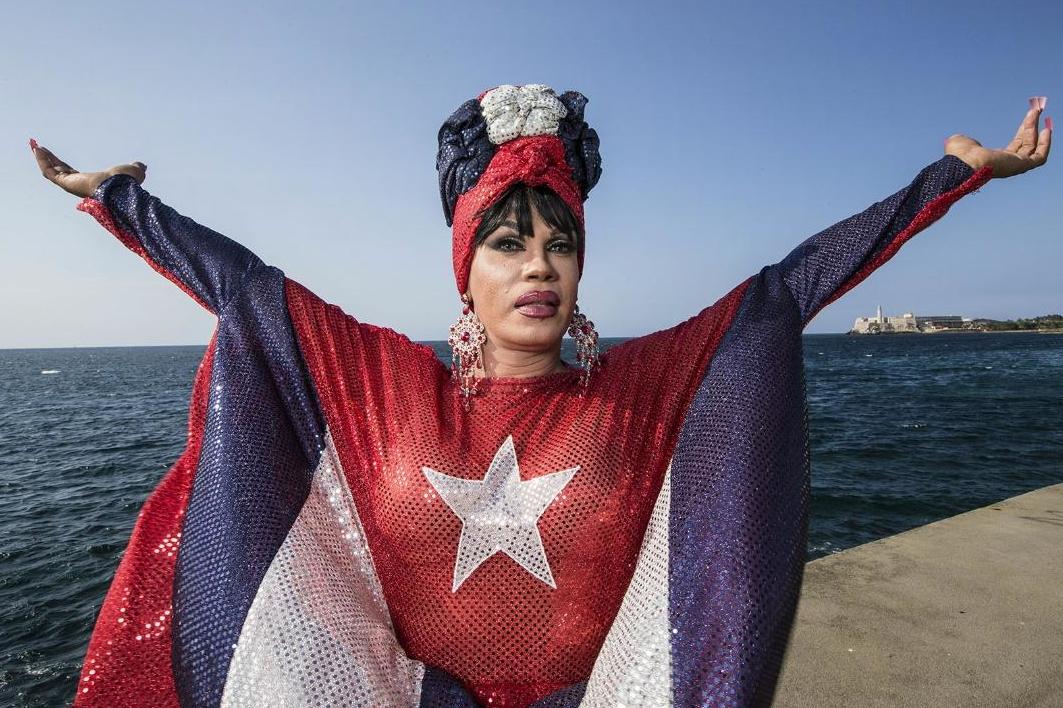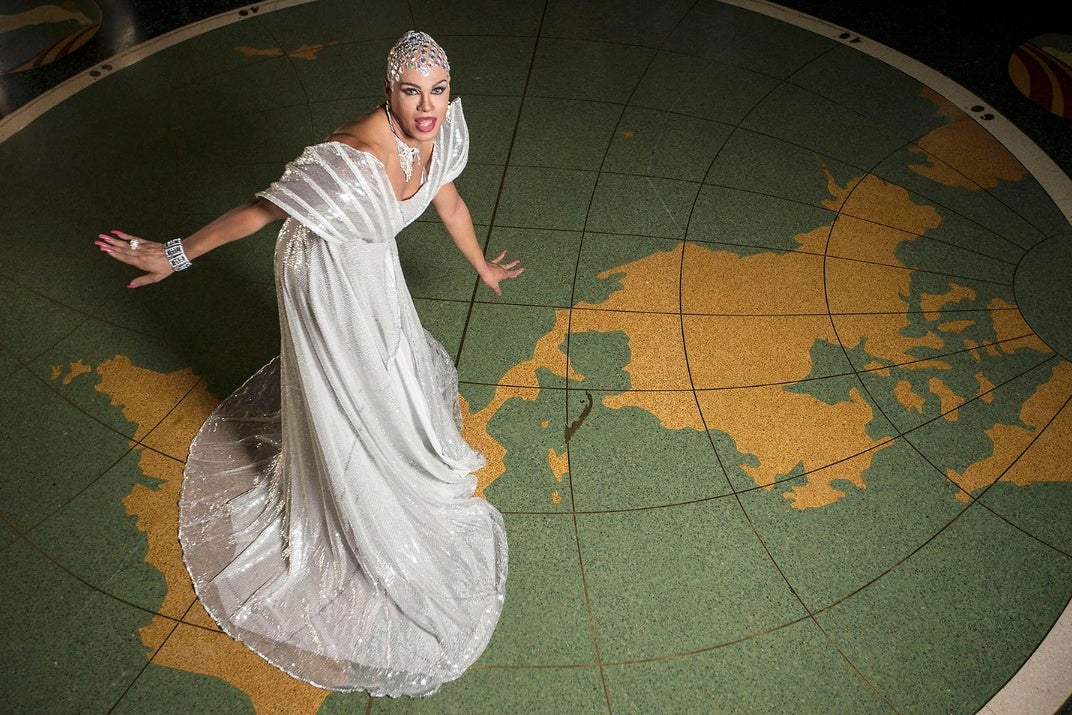Cuba's most famous transgender drag queen has a message for Trump: 'Lift the embargo'
As US officials label Cuba part of a 'troika of tyranny', activists warn against moving away from the detente of the Obama years

Your support helps us to tell the story
From reproductive rights to climate change to Big Tech, The Independent is on the ground when the story is developing. Whether it's investigating the financials of Elon Musk's pro-Trump PAC or producing our latest documentary, 'The A Word', which shines a light on the American women fighting for reproductive rights, we know how important it is to parse out the facts from the messaging.
At such a critical moment in US history, we need reporters on the ground. Your donation allows us to keep sending journalists to speak to both sides of the story.
The Independent is trusted by Americans across the entire political spectrum. And unlike many other quality news outlets, we choose not to lock Americans out of our reporting and analysis with paywalls. We believe quality journalism should be available to everyone, paid for by those who can afford it.
Your support makes all the difference.The sun sets on Havana as male dancers carrying colourful fabrics, sequin lace dresses and peacock feathers rush into Las Vegas nightclub, located just steps away from The Malecon, a seaside promenade serving as the city’s unofficial nightly gathering point.
Just a few years ago, Cuba would never have allowed the LGBT-friendly venue to exist in such broad visibility. After Fidel Castro’s 1959 revolution, the state persecuted gay men and women for years, sending people to labour camps, forcing the repression of millions by outlawing homosexuality and implementing strict laws which led to widespread harassment of the LGBT community during the 1960s.
But the cabaret performers have no spare time tonight to reflect on their nation’s history, or even to share a Havana Club with some of the regulars flooding into the bar. The show is running slightly behind schedule due to a last-minute ordering issue. Dancers race against the clock to jump into their tight costumes while applying bright makeup. Nearly a hundred guests somehow packed into the room within minutes of the club opening its doors, as the lights are lowered for show time.
The queen is about to arrive.
Imperio, a Havana-based drag queen and one of the island’s most famous transgender entertainers, has garnered an impressively-sized fan base over the years, all while lacking the resources and internet followings amassed by notable RuPaul’s Drag Race contestants like Sasha Velour or Shangela.
There is no question of her stardom, as she attempts to quietly walk through the club’s front doors to get backstage. Patrons kiss Imperio’s hands as she walks by, admiring her freshly-painted nails and overall glamour. If she was at all stressed about her late arrival, that anxiety had already been tucked away under a coating of professionalism and glitter long before she made her entrance.
Living in Cuba with limited to access to internet and social media, the entertainer has found herself at the forefront of a rainbow revolution: the government is currently overhauling its constitution and considering an effort to include marriage equality as part of those reforms, slated to take effect in 2019.
That effort has been aided by the high-profile advocacy of Mariela Castro, director of the Cuban National Centre for Sex Education (CENESEX) in Havana and the daughter of former president Raul Castro, the brother of Fidel.

Organising a modern movement of LGBT activism and visibility across Cuba takes more than governmental sway, however. Progress relies on influential voices like Imperio, who has helped bring her community into the light of day by marching at the nation’s first annual Pride parade alongside Ms Castro, as well as showcasing equality and tolerance three nights a week at Las Vegas nightclub.
Imperio is acutely aware of what she sees as the singular thread connecting progress within the local LGBT community and the nation’s evolving attitudes and constitutional reforms: Cuba’s slowly increasing economic prosperity, in-part thanks to a cooling of tensions with the United States under former president Barack Obama.
But the US trade embargo against Cuba – the most enduring of its kind in modern history – still serves as a choke-hold on the nation’s economy, while the government has sought to transition from a command economy established in the Soviet era to one focused on “prosperous and sustainable” socialism.
The embargo has cost Cuba’s economy nearly $130bn over six decades, according to a United Nations report released earlier this year. The global alliance has voted overwhelmingly on non-binding measures, calling on the US to lift the embargo annually since 1992.
That pressure is now mounting as Cuba emerges as one of the more influential nations in Latin America, and it’s not just coming from members of government. As the nation increasingly opens its doors, with an influx of US tourists in recent years and the government providing journalists full-time access to internet on their mobile devices – the first group of any Cubans with that right – it seems as if its people are beginning to find their voices on the global stage..

However, recent announcements from John Bolton, the national security advisor at the White House, will likely set such progress back. At the start of November, Mr Bolton labelled Cuba part of a ”troika of tyranny” alongside Venezuela and Nicaragua, imposing new sanctions and making clear that the policy of the Obama era is over.
“In Cuba, Venezuela, and Nicaragua, we see the perils of poisonous ideologies left unchecked, and the dangers of domination and suppression,” said Mr Bolton during a speech in Miami. “The troika of tyranny in this [Western] Hemisphere –Cuba, Venezuela, and Nicaragua – has finally met its match”.
While there is still much to be done over human rights in Cuba – and diplomatic relations with Washington have not totally been cut – there is worry about what the new Trump administration policy will mean in the long term.
Imperio provided a simple, albeit blunt message to Donald Trump and the US government in an interview with The Independent: “Lift the embargo”.
After a dynamic and animated performance that included polishing off nearly an entire 12-pack of local beers, Imperio left up the stairs from the side of the stage to thunderous cheers and applause.
I followed shortly after, making my way through a smokey room with security towards an admittedly far-less glamorous dressing room than I was used to, for a queen of Imperio’s stature. She didn’t seem to mind, and had already began to take off her makeup by the time I had arrived.
I wanted to speak to her about what it was like being a transgender person in Cuba, as well as a drag queen, and hear her opinions on a range of important issues impacting her community. There was just one rule: No pictures were allowed to be taken during her transformation process at any point, she had told me in Spanish.
Imperio says she began discovering her identity as a transgender woman “30 years ago, when it still wasn’t permitted in this country”.
“Thankfully, it was because of the support of a woman back then who worked for [the National Assembly of People’s Power], her name was Fefi, she helped me push for it,” she says. “Years went by. Thanks in part to CENESEX and Mariela Castro, they have managed to dignify us and put us up at the forefront of our revolution through theatre.”
She adds, “It’s because of their initiatives on these issues that this cabaret is able to exist”.
During the show, Imperio chats with guests and calls on members from the crowd to join her on stage for a dance or song. Unlike a local drag brunch performance, however, the cabaret show at Las Vegas is a spectacle for tourists from across the globe; at one point, Imperio flirts with a Jamaican man who identifies as straight and had come to the bar with a group of friends, who laugh and record him as he shyly chats with the drag queen on stage.
Imperio says she no longer faces any intolerance as a transgender woman in Havana. “In these moments, it’s not difficult to be trans in Cuba,” she says. “Whoever decides to be trans in these times, not only in Havana but on a national level, it’s easy because it’s permitted – and that’s not a lie or anything.”
The nation does not currently provide funding for those seeking transition surgeries, which can be costly, though there are some methods of receiving universal coverage for trans health needs in Havana.
Ms Castro, who spearheads CENESEX and also serves as a legislator, told reporters at a recent press conference her organisation had drafted numerous proposals for the new constitution that sought to extend marriage equality and other rights and protections to LGBT Cubans. The government is spending the month of November combing through draft proposals for the constitution before holding a vote on which to accept as the new laws of the land.
Progress has not come overnight for the community, but there is clearly a new day on the horizon. With Ms Castro leading the charge, Imperio says she is confident marriage equality will be adopted into the new constitution.
“As far as I know, I think the union between same-sex people will be approved in the new constitution”, she says.
When it comes to her thoughts on Mariela Castro leading the way for LGBT rights in Cuba, Imperio’s response is clear despite the families history.
“I think that my opinion is the feeling of the entire community here in Cuba. Thanks to her, we have won many battles. Thanks to her, we still have a lot of things to accomplish, and if it wasn’t for Mariela Castro, the community in Cuba wouldn’t have been able to make the advancements it has.”
For now, the fate of marriage equality in Cuba remains in question. As the government considers extending those rights to the once-severely oppressed LGBT community, Imperio is imploring Americans to remember the connections shared between both nations – and to support their fight for freedom.
“Support the Cuban community, because we are fighting to move forward despite the United States being bent on every day making more difficult the development of the country,” she says. “Support us, because in the moment when the LGBT community is being pushed forward, they will then push forward the rest of the country.”
Subscribe to Independent Premium to bookmark this article
Want to bookmark your favourite articles and stories to read or reference later? Start your Independent Premium subscription today.
Join our commenting forum
Join thought-provoking conversations, follow other Independent readers and see their replies
Comments